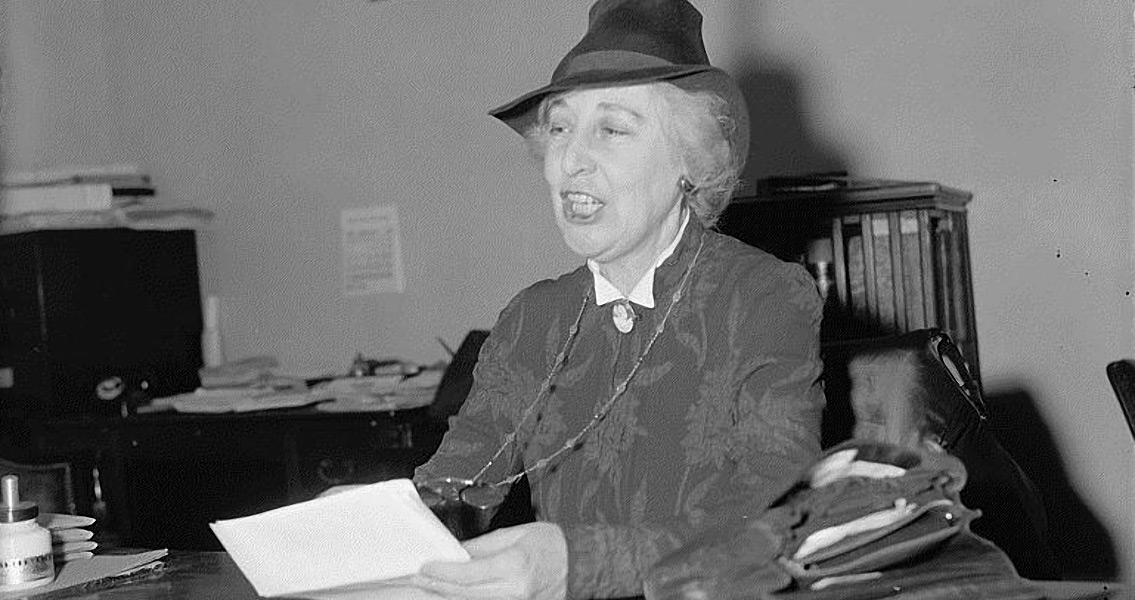<![CDATA[On 8th December 1941, the United States woke up to the aftermath of the Japanese attack on Pearl Harbor. Newspaper front pages were dominated by shocking images of the devastation that had descended on the Pacific fleet stationed in Hawaii. The President, Franklin D. Roosevelt, headed to Congress to ask permission to declare war in response to the sobering events. The resolution was passed with an overwhelming majority: 388-1. Just one member of Congress voted against war with Japan but who was she, and why did she did she do it? Montanan Republican Jeanette Rankin was the lone dissenter. It was a move which would have a devastating effect on what had hitherto been a remarkable political career. Even as she cast the vote, she was subjected to a tirade of boos and hisses from the other members of Congress. Condemnation of her stand was immediate and terrifying. Attempting to make her way back to her office, Rankin was forced to seek refuge from angry crowds in a telephone box. She was only able to complete her journey under police escort. Decades earlier Rankin had voted against US involvement in the First World War, but she was one of many - pacifism a much more acceptable stance in 1917 than it was on the morning of 8th December, 1941. The USA was hungry for revenge. Divisions between isolationists and internationalists had been wiped out in the space of two hours on the morning of 7th December, the majority of Americans now firmly in favour of war. Anti-Japanese sentiment had been slowly forming over the last decade, as the USA came into diplomatic conflict with Japan over its expansion in the Pacific and Asia region. Pearl Harbor turned it into a fall bloodied desire for retribution. Rankin, who in 1914 became the first woman elected to public office in the USA, was a life long pacifist. Years after leaving Congre she would become a passionate campaigner against US involvement in the Korean and Vietnam Wars. Her maiden speech to the US Congress in 1917, as she was asked to vote on the war resolution that brought the USA into World War One, sums up the views she would hold throughout her political career. "I want to stand by my country, but I cannot vote for war. I vote no." Ever since the Second World War had started in Europe, Rankin campaigned against the USA becoming embroiled in the bloodshed. As the isolationist debate raged, Rankin actually stayed fairly distant from the largest isolationist group, the America First Committee, because their anti-New Deal stance stood in conflict with her own domestic policies. Her pacifist views however, remained explicit and strong. In particular, she took exception to the Lend-Lease Bill which saw the USA supply the Allied forces. In February 1941, she attempted to get an amendment made to the bill stipulating Congressional approval if US troops were ever going to be sent to Europe. "If Britain needs our material today,” she asked, in a speech proposing the amendment, "will she later need our men?" A few months later, she introduced a resolution condemning any attempt "to send the armed forces of the United States to fight in any place outside the Western Hemisphere or insular possessions of the United States." Rankin believed Roosevelt was deliberately trying to bring the US into the war in Europe. Her actions early in 1941 were a clear attempt to block what she saw as a plan by the President to slowly increase US involvement in the conflict. Her response to Pearl Harbor can also be seen in this light. Rankin believed the President had been deliberately provoking Japan with trade sanctions and embargoes, knowing that war with Japan would necessitate a war with the other Axis powers: Germany and Italy. The vote itself was a chaotic one. After the first reading of the war resolution, Rankin was ignored in the debate, the House Speaker refusing to recognise her while other members yelled at her to sit down. Other senators approached her on the floor, demanding she either vote yes for war or abstain. After the roll call vote was taken, and Rankin had cast her decision, she announced. "As a woman I can’t go to war, and I refuse to send anyone else." Her Montana constituency quickly turned against her, any isolationist sentiment in the United States that might have won her sympathy completely overrun by the shock of the Pearl Harbor attack. The rest of Rankin's term had been rendered irrelevant. Her colleagues and the press simply ignored her. She confided to some of her friends "I have nothing left but my integrity." In 1942 she opted against running for reelection. In 1973 she passed away in Carmel, California. At the time she was considering a run for a seat in the House of Representatives in order to protest the Vietnam War, a committed pacifist until the very end. ]]>
The Day After Pearl Harbor, Rankin Alone Votes No to WW2
